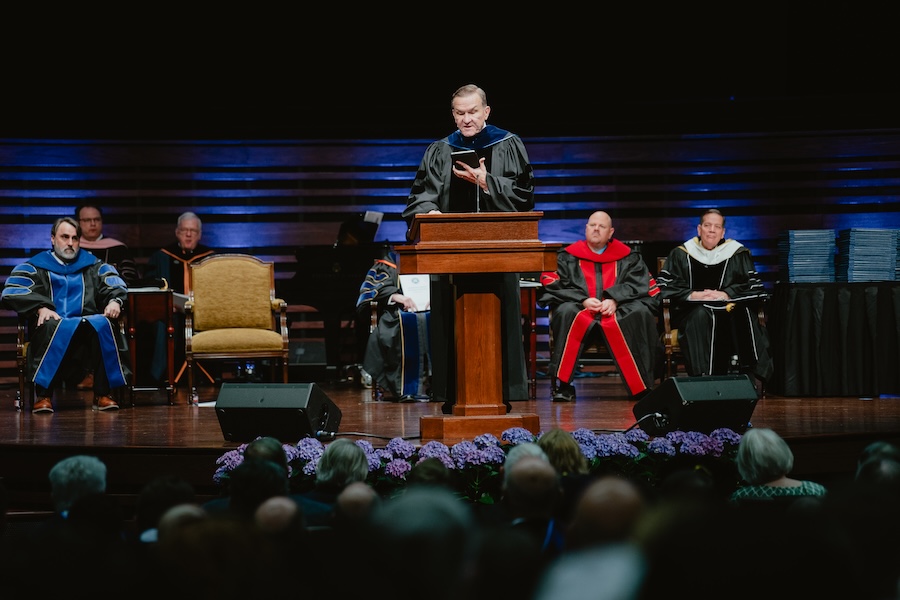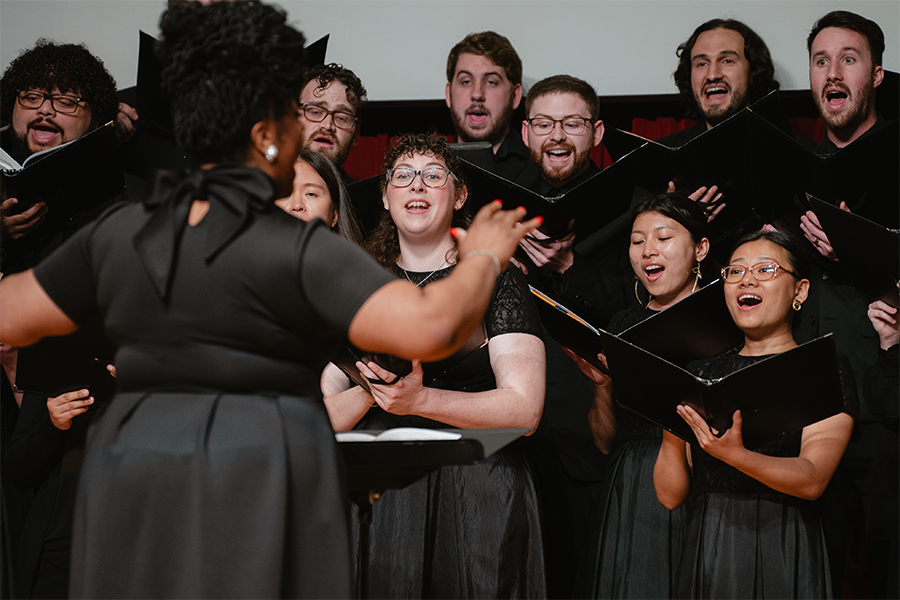Southwestern announces revised, quicker MDiv with practical focus

After more than a year of deliberation by the faculty and administration, Southwestern Baptist Theological Seminary is introducing an updated Master of Divinity degree with the goal of providing effective ministry training applicable for the 21st century with fewer credit hours, seminary leaders announced today.
Provost W. Madison Grace II said the seminary leadership is always looking for ways to improve the curriculum in order to better equip students for ministry. And 18 months ago, they began the process of updating the MDiv program, creating a curriculum committee chaired by research doctoral studies director Joshua Williams.
“This is a good step forward,” Grace said of the changes that were approved by the faculty unanimously earlier this year and affirmed by the Board of Trustees on April 9. The goal, he said, is “creating a curriculum that helps our students be equipped as best as possible for the 21st century.”
A lengthy process involving Southwestern faculty led to the revised MDiv, which includes courses arranged more effectively so the degree could be completed in 82 hours, a net reduction of six hours as the faculty added, removed, and narrowed courses to best suit the students’ needs. Grace said he is excited for these changes, though the majority of the degree remains the same.
“We want to constantly look at what is best for our students,” Grace said, adding that he and others spoke with pastors and others in ministry about how to refine the MDiv program. “And we’re committed to constantly evaluating our curriculum so that Southwesterners will be successful for the Kingdom.”
President David S. Dockery said he had the privilege of participating in three of the presentations given to pastors and members of the seminary’s Board of Reference, and their response to the changes were positive.
“The enthusiastic and supportive response leads us to believe that the seminary’s academic leaders and faculty members have done well in aligning the program with ministry preparation expectations framed by the seminary’s missional commitments to the Great Commission and the Great Commandment,” Dockery said.
The ethics requirement in the MDiv is now a course entitled Christian worldview and cultural engagement. This course will examine how the Christian worldview should frame interaction with the world. It will consider how other worldviews engage cultural issues, and how Christians can respond to them. Grace said this course will continue to focus on pressing issues such as the LGBTQ movement, marriage, artificial intelligence, transhumanism, abortion, euthanasia, work, and family.
“It’s incumbent upon us to equip our ministers to talk about worldview as they go out to lead people,” Grace said. “So that will be an important part of this program and a good, helpful intro into talking about some of these more cultural issues.”
“I am particularly excited about the Christian worldview emphasis,” Dockery said of this revised course.
Concentrations of at least 12 hours will still be available through the required four hours of electives. The MDiv will also now include a “selective,” a modified approach to electives, where students can choose between biblical counseling, theology of worship, and disciple making.
The advanced preaching course has moved from two credit hours to three and there is a new research and writing course, while spiritual formation will be extended so faculty can engage further with students at a spiritual level.
The area of pastoral ministry is also adjusted to provide more practical knowledge needed in ministry today. This will include two courses, pastoral ministries and church leadership and administration. These courses will continue to engage in pastoral training as well as give increased attention to areas of leadership and church administration, including MinistrySafe training, business meetings, human resources, and personal and church finances.
One of the changes in the MDiv is a revision of required biblical languages from 15 to 12 credit hours. Although there are fewer classes to take, Grace said this change allows for syntax to be taught in both the Hebrew and Greek courses. Another revision is the reduction in systematic theology hours from three courses to two.
Grace said the changes to the MDiv program has led to slight adjustments in other degree programs as well.
“The MDiv is central to all of our other programs,” Grace said, explaining its connection to the variety of programs Southwestern offers for ministry training. “The MDiv is the most comprehensive of all of our master’s degrees. And what’s taught in the MDiv affects every other master’s degree, entrance into our doctoral programs, and affects how we teach at Texas Baptist College in our five-year programs.”
Despite the changes made to the program, Grace emphasized it is important to recognize the things that were not changed, including evangelism and missions, philosophy, apologetics, church history, hermeneutics, and Baptist heritage.
“We want to equip for ministry issues today,” Grace said. “In a post-COVID world, ministry has changed, and so our curriculum needs to reflect that. And I think we’ve accomplished that here, and we will continue to do that as the world changes.”
Grace commended Williams for leading the curriculum committee with a grace-filled and Christ-centered spirit, as well as the other faculty for working together, listening to other ideas, for the sake of what the students need to be equipped for ministry in the ever-changing world.
“This was faculty-driven the whole way,” Grace said. “I think it’s important that we went through a process to make sure that this is all in line and that the curriculum’s owned by the faculty.”
Dockery said the revised MDiv “will serve Southwestern students well. I applaud the fine guidance that Provost Madison Grace and Professor Joshua Williams provided for the faculty, leading to the faculty’s unanimous support for this student-focused curriculum,” adding that the “curriculum changes have been made with great sensitivity to all current accreditation expectations.”
Incoming students can enroll in the new MDiv while returning students will receive further information in an email from the Registrar’s Office about the opportunity to adjust their current master’s degree to fit into the revised version, including those in programs such as the Master of Arts in Christian Education or Master of Arts in Biblical Counseling. Students who have questions can reach out to the Registrar’s Office.
Current and prospective students interested in more information can visit here for details.



